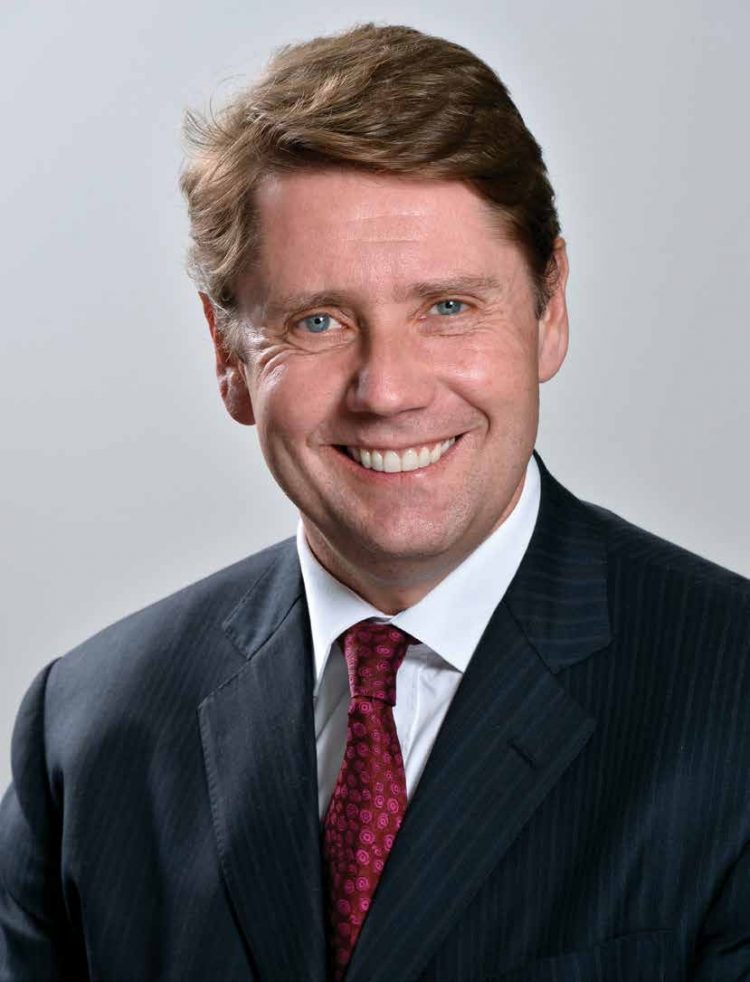When Matt Bekier was appointed CEO of Star growth expected when 2017 results are released later this year and entertainment Group – then known as echo entertainment – in 2014, the company was reeling from a 30.5% fall in profits, plunging share prices and ongoing public relations nightmares including the sacking of former Managing Director Sid Vaikuna just months after The Star’s 2012 relaunch following an AU$900 million redevelopment. In the years since, Bekier has turned it all around with 2016 revenue up 24% from two years earlier, continued shares responding with an increase of well over 100%. Last year, Star entertainment Group also announced further expansion plans that include building a new AU$500 million Ritz-Carlton hotel tower in Sydney as well as an additional AU$850 million upgrade and expansion of it’s The Star Gold Coast property, formerly known as Jupiters. All of this on the back of a winning bid alongside Hong Kong partners Chow Tai Fook and Far East Development Corp in 2015 for a AU$2 billion Integrated Resort development on the Brisbane waterfront.
Ben Blaschke: Let’s start from the beginning. You were promoted to the top job at Star Entertainment Group, or Echo Entertainment as it was called back then, in 2014 at a di cult time for the company. With all that was going on, where did you start in terms of turning it all around?
Matt Bekier: When I came on I had already been with the company for a long time. I joined Tabcorp as Chief Financial Officer in 2006 and Tabcorp was the parent company of what then became echo entertainment. After the demerger I became CFO and Director of Finance, so I knew the company very well and when I was appointed to this role I had a different perspective to a lot of outside observers.
I could see a lot of the good work that had been put into the company to establish a good foundation and I thought we were actually further advanced than people thought. As a result, when I took over I was able to build on that good work others before me had established which then led to a very quick turnaround.
If you look at the sequence of events, the earnings turned around very quickly – that wasn’t due to my work in the first two weeks! It was, realistically, bringing things to fruition that had already been in the making.
BB: How advantageous was it for you to have already been with the company for almost a decade and therefore already be familiar with it?
MB: I thought it was a big advantage – not just that I knew the company but that I knew the people. I knew who I needed to push and who I could push, who I could rely on. That was a big advantage. And I knew where the untapped were that I couldn’t proceed on in my previous role. Now that I was CEO I had license to go after those .
When the board appointed me, they knew very well what they were getting. I was very keen at first to clean house and jut establish some ideas, move obstacles, structures and processes that I didn’t think added any value while simultaneously rebuilding our capability in marketing. I thought it would be a great asset we could build up that we just weren’t selling effectively.
That was my mandate early on and had I come in cold it would have been harder to be convinced that they were the main things that needed to be done straight away.
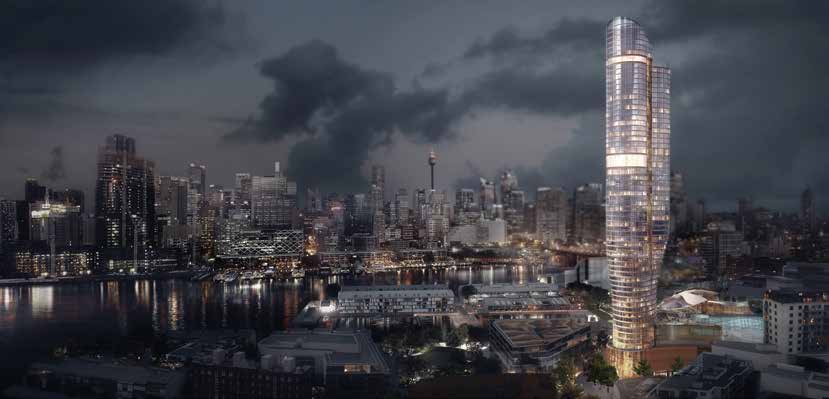
BB: What did you identify as the main challenges as well as the main facing the company at the time?
MB: The main challenge in the early years was the credibility of the company. As you pointed out we had a pretty funky life early on and we lost a bit of paint with some stakeholders – investors in particular – but also ratings agencies, government agencies and regulators, so that was a big focus for us, not to make those same mistakes.
We were obviously very focused on delivering a result utilizing operations that were low risk and would help us build our credibility. That really all came together with the Queen’s Wharf bid where we were able to demonstrate that we were now a serious contender for the biggest development in Australian gaming.
BB: Your appointment as CEO came about a year after the completion of a AU$900 million redevelopment of The Star in Sydney but just two years later, in 2016, you announced even bigger redevelopment and expansion plans. Why the need for more redevelopment so soon?
MB: It wasn’t so much need as . When we announced the first AU$900 million expansion here at The Star, EBITDA was AU$200 million. Now, four years after completion of that program, we’re running at around AU$340 to $360 million. So we were looking at that and recognizing that we’re starting to get a pretty decent return on our investment. And as you reflect on it, the for us are very substantial.
In Sydney for example, our market share on slots is just under 10% and Australia as you know has one of the highest spend per capita on gaming in the world. These are very big numbers and we think we can take additional share in the Australian market.
In parallel to this new , the work we’ve done on inbound tourism demonstrates that we need to have a lot more hotel capacity. When we look at it, this is an that I think will sustain in Australia – and I’m not just talking about casinos but the tourism industry in general – for many years to come.
I grew up in Switzerland and in Switzerland we’ve built an economy around tourism. I look around Australia and I think with all the advantages we have here in terms of proximity, in terms of the o er that is so relevant to the Asian guests that we welcome, we’re undercooking the and one of the biggest bottlenecks right now is hotels.
Airports for example – by 2022, Brisbane airport will have more capacity than Hong Kong. We’re building a second airport in Sydney and opening up regional airports. More and more airlines are flying directly to Australia from Asian cities, so transport is not the issue. The issue is that when people get here, where do we put them? That’s what interested me more in terms of expansion .
BB: So The Star is missing an at the moment due to a lack of hotel rooms?
MB: Right now we estimate that about 20% of all of the tourists that come to Australia find one of our properties. I say “find” because we’re not advertising anything internationally – we’re not really present – because we don’t have the room capacity to market. As a result, we estimate that only around 3% of our revenues come from those tourists. That is way too low.
We have a massive and I would like to see it go up to 10% in the next four to five years, but in order to do that we need hotel rooms because otherwise there is no reason for people to come here.
Of course, we will progess some way simply because tourism numbers continue to grow but the big step up will be once we have our hotels present and can accommodate people here.
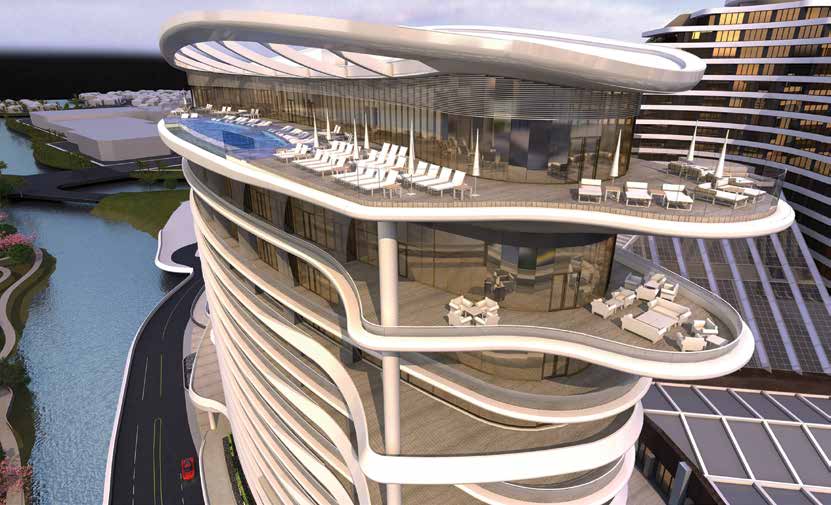
BB: This latest redevelopment in Sydney is set to take place over three stages. Can you run through what those stages involve?
MB: When we did the first expansion for AU$900 million, we built a second hotel tower, added food and beverage and got rid of the “old” feeling of the property. We feel it is now a modern, attractive, good-looking main gaming floor.
We never really touched the private gaming rooms but that is now a very substantial part of our business. The top tiers of our membership base have been growing at a considerably faster rate so the first stage for us has been upgrading our existing private gaming capacity for domestic high end customers and expand further the facilities that we have.
In parallel with that we are upgrading the public amenities such as the lobby, the poker room and food and beverage to improve the whole property. The third stage, which is still in planning, is the creation of an additional hotel tower which will be the Ritz-Carlton.
BB: How significant is the Ritz-Carlton to The Star’s ambitions moving forward?
MB: Very. The first five star hotel that opened after the 2000 Sydney Olympics was The Darling which we opened in 2011 and since then nothing else has opened despite inbound tourism continuing to grow at double digits for as long as anyone can remember. As a result, around times like Christmas it is impossible to get a room in this town. During Chinese New Year, for example, we actually took significant room inventory in other hotels because there were so many guests that wanted to come to Sydney.
BB: To what extent did Crown’s announcement in 2013 that it planned to build a VIP casino at nearby Barangaroo prompt The Star’s own expansion plans?
MB: The first stage of investment was already done before the whole Barangaroo thing broke ground. Now with investment going into our private gaming rooms, that is really driven by the need we have today to provide those facilities to our guests. I wish we had done it years ago.
There is no doubt it will help us when we have that competition down the track but that’s not the main factor, it was just a way for us to tap into the market.
The Ritz-Carlton tower is clearly aimed that way because of the lack of hotel rooms. We’ve done some modeling and in Sydney, for the size of the casino that we have, we could do with another 1,000 hotel rooms. The Ritz-Carlton will help but we still need another 700 after that.
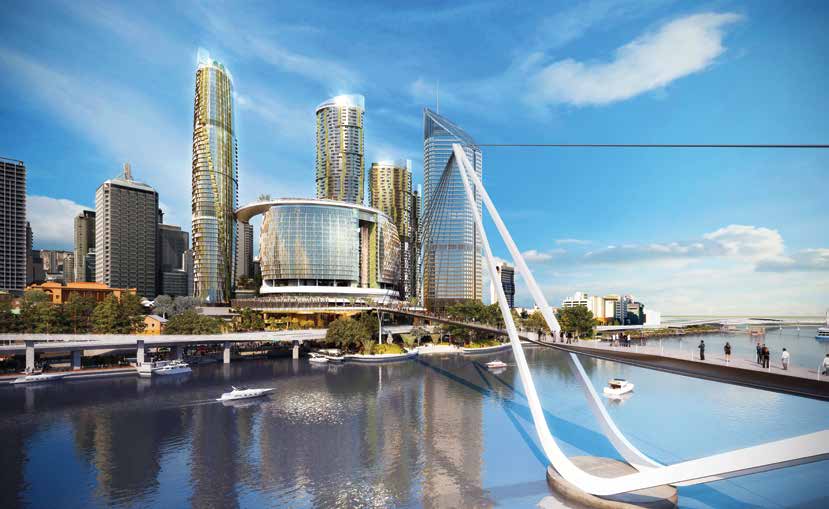
BB: Sydney is of course the flagship property and Queen’s Wharf will be a hugely important development too. Where does the Gold Coast and what you’re doing there fit in to the grand scheme?
MB: The Gold Coast is a fantastic , particularly when you consider tourism there. When you think about what Asian tourists are looking for, it’s the quintessential Australian experience – shopping is important, food is important, value for money – and we have all of that on the Gold Coast.
The property is located next to the biggest shopping center in Queensland with all the major brands, we are a stone’s throw away from some of the greatest beaches in the world – it’s a fantastic location.
The Gold Coast is a standalone location and we are now developing a hotel tower there as well with private gaming facilities aimed at domestic and international high-end customers. That will open before Christmas this year. We think there is a lot more potential on the Golf Coast.
With Queen’s Wharf we’ll have a precinct with five hotels that will bring four million incremental visitors to Brisbane. What we’re doing with the Gold Coast is providing a companion piece to that. We see it as an to extend the trip – enjoy an urban experience in Brisbane and then the quintessential Australian beaches experience on the Gold Coast.
That’s why we’re so excited about the Gold Coast and it’s why we bought the Sheraton when it became available because it is another great when it comes to visitors extending their trip (Star purchased the Sheraton Mirage Resort located alongside the Gold Coast’s Main Beach last October for AU$140 million).
BB: You have partnered with Hong Kong property developers Chow Tai Fook and Far East Consortium on the Queen’s Wharf development. First of all, how did that partnership come to be?
MB: The bidding process for Queen’s Wharf was a two year process. It started with expressions of interest, then a long list and a shortlist. During that process, multiple parties talked to multiple other parties to see how they might be able to complement one another.
Our attraction to Chow Tai Fook and Far East Consortium as partners was that not only do they have expertise in property development – Far east has a couple of billion dollars worth of real estate in Australia today and Chow Tai Fook is one of the largest property developers in Hong Kong – they also have tourism experience, so there was a big attraction for us to get together with someone who could help us build while adding extra tourism capabilities.
BB: Did you consider at any stage raising the capital for the project on your own rather than using partners?
MB: Not while I was CEO.
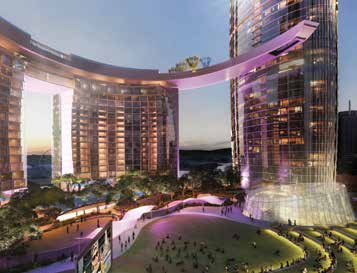
BB: What do they bring to the table as partners?
MB: Chow Tai Fook brings the Rosewood hotel brand which is one of the greatest luxury brands in the world. More broadly, we find that when it comes to designing something that appeals to the affluent Asian tourist, it helps to have a partner that has a deep understanding of the Asian customer and how they like to spend their money as well as access to customers. There are a whole heap of positives that come with having them as our partners.
BB: The biggest news in the gaming industry over the past 10 months has been the arrest and prosecution of 17 Crown Resorts employees in mainland China for promotion of gambling. What is your reaction to those events?
MB: Well obviously when you look at our numbers, it had a negative impact there and it’s something that caught my attention straight away. It’s a space that we are watching with great interest obviously and I should say that we are acutely aware of the regulations in the different markets that we operate in and we take our obligations very seriously.
BB: How big was that impact on your VIP business?
MB: Well in the first four months of the financial year our VIP business was travelling pretty much on par with the previous period (The Star reported international VIP revenue of AU$596 million in its 2016 annual report) and then the next three months we went backwards to the tune of 25%.
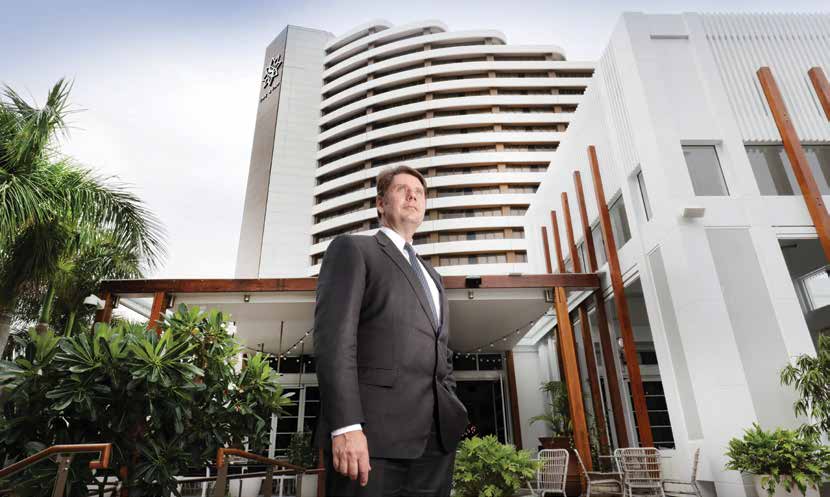
BB: Last year The Star completed upgrades to its international VIP facilities including rooms at the top of Astral tower with sweeping views of Sydney as well as some Macau-inspired rooms. At that stage it was clear that attracting more international VIPs was a focus. Has that focus changed?
MB: The whole VIP space is one that, if you go back in time to when Star entered the VIP market in 2005, we weren’t really a big player because the property wasn’t up to scratch, the hotel wasn’t up to scratch. It’s only since we made that investment to make the property world class and bring the rooms up to a global standard that we started to pick up some momentum, but in a global context The Star never got more than 1% of the global market share. Particularly in the early years of our participation in the market there were a very, very small number of large players that for whatever reason decided to come here.
That’s not the future of this business. The future of this business for us looks a lot more like the high-end tourism experience because for us, as an Australian proposition to promote gaming as the sole reason to travel just doesn’t wash. You don’t get a visa, you don’t book a fight and travel for 14 hours to do exactly what you can right next door in Macau.
Our proposition has really evolved into the customer who is into the tourism experience. We can put experiences to these customers that they can’t have anywhere else. That’s the logic of our customers. Gaming is not the prime focus of what they’re doing but it’s the most sustainable business proposition for us. Again, we need more hotel rooms for that because if you’re only going for a small number of high rollers, you only need a couple of hotel rooms. If you’re looking at a larger group of business people with children, a family that wants to go and cuddle some koalas and go on a boat trip while here, play golf on the Gold Coast, go deep sea fishing and hit the beach – for those people we need a lot more rooms.
It’s not just about Asia either. Right now Asia is really hot but if Matt Bekier at our strategy of bundling tourism experiences at the very high end is correct, we want to make that available to everybody. We’re looking to diversify and we’ll be looking to enter new markets with that offer.
BB: With that in mind, what sort of mix are you looking for in regards to those experience seeking customers versus VIPs?
MB: Right now in terms of EBITDA contribution, about 15% of our earnings come from international VIPs. I don’t anticipate any significant change there. I think that for the capabilities that we have and what we have to offer, our growth potential both domestically and internationally are about the same.
BB: Does Star have any ambitions beyond Australia?
MB: No. Our capabilities are purely in Australia. And if you think about what makes us successful right now it is selling Australia as a destination and selling to Australians the experiences that we have here. That’s a special kind of skill but I’m not sure we have anything unique to offer in Japan or Macau. We’re much better served focusing on inbound tourism to Australia rather than trying to go into those markets and compete with other operators. We don’t have a global brand but we do have enormous growth potential when focusing on our market.






